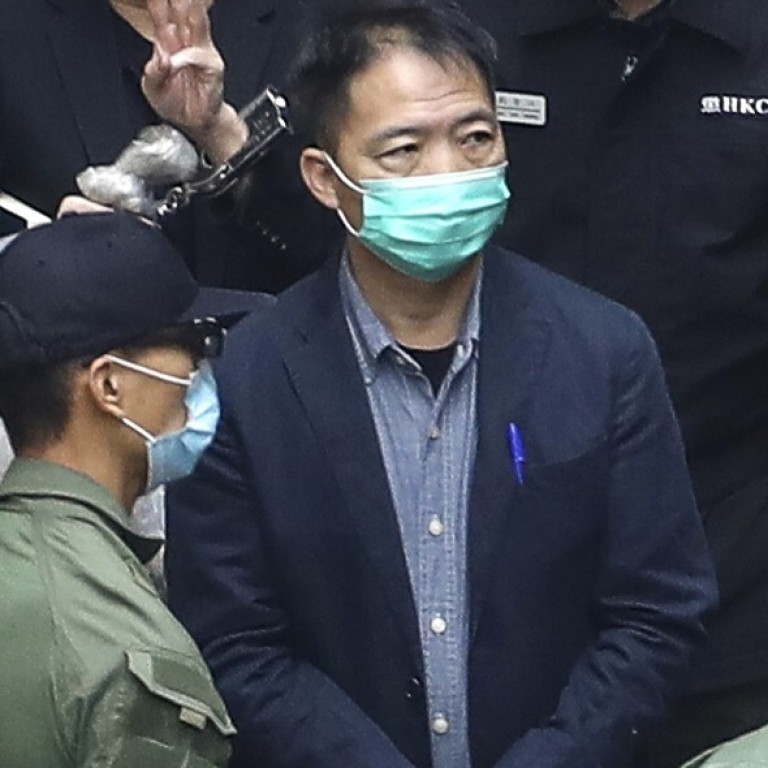
Hong Kong national security law: ex-lawmaker in jail awaiting trial barred from attending father’s funeral, told he can watch online
- Wu Chi-wai’s application to attend in person was rejected on security grounds, Correctional Services Department says
- The former Democratic Party chief – whose father died last month – is facing three separate trials, including one involving a national security law charge
Prison authorities have barred the detained former leader of Hong Kong’s biggest opposition party from attending his father’s funeral and offered to live-stream the ceremony for him instead, triggering a furious response from the family.
The Democratic Party’s Wu Chi-wai, currently in custody awaiting three separate trials, had earlier requested permission to pay tribute to his father – who died last month – in person on Friday.
Rejecting media reports the decision was politically motivated, the Correctional Services Department said subsidiary legislation required officials to take into account factors such as security risks, possible escape routes and the charges involved when processing such requests.
After the funeral’s details were reported, the spokesman said, online calls were issued for members of the public to show up and lend their support.
“After a risk assessment, the Correctional Services Department has decided to reject the application to protect the safety of correctional officers, the person in custody and members of the public,” the spokesman said.
However, the department said it was sympathetic to Wu’s situation and had therefore decided to allow him to watch a live stream of the funeral.
Wu’s party colleague, Albert Ho Chun-yan, revealed Wu had offered to be handcuffed and wear prisoner clothes so he could be present for the ceremony, and was prepared to stay for just five minutes.
“This is really inappropriate and inhumane,” Ho said of the department refusing Wu’s application.
In a separate statement, the party said that prison authorities had proposed sending officers to film the proceedings and relay the live footage to Wu, his father’s only son.
“Chi-wai and his family members have rejected the arrangement as they find it intolerable [for the authorities] to show such disrespect to his late father,” the statement said.

Democratic Party chairman Lo Kin-hei also called on authorities to reconsider their decision and vowed to make every effort to encourage them to change tack.
But pro-establishment lawmaker Gary Chan Hak-kan, who chairs the Legislative Council’s security panel, said the department’s ruling was appropriate.
He said people who had been planning to answer online calls to attend the funeral could have posed a risk to Wu’s safety, while also increasing the chances of him absconding.
“You also have to take into account that Wu is accused of possibly breaching the national security law,” he said.
But Richard Tsoi Yiu-cheong, from the Society of Community Organisation, which advocates for prisoners’ rights, said the more stringent bail requirements imposed by the national security law should not be confused with the department’s discretionary powers in this area.
The department said it did not keep track of how many of these types of application it had approved.
In 2014, the department declined to let former feng shui master Peter Chan Chun-chuen attend his mother’s funeral, saying it was inevitable his presence would draw a huge number of journalists.
Chan was jailed for forging a will so he could inherit the multibillion-dollar estate of his late lover Nina Wang Kung Yu-sum, who was once Asia’s richest woman.
Tycoon Thomas Kwok freed after three years in prison for bribery
But in 2018, prison chiefs granted permission for the then jailed property tycoon Thomas Kwok Ping-kwong to visit his ailing brother Walter Kwok Ping-sheung in hospital before he died.
The Sun Hung Kai mogul had been jailed for bribing former chief secretary Rafael Hui Si-yan.
In March 1997, the then commissioner of correctional services Lai Ming-ki allowed Yeung Mok-yeh, a young murderer jailed in Stanley Prison at the time, to attend the funeral of his parents, who were killed in a car crash. Yeung was convicted of murder after a gang fight in April 1990 when he was 17.
Former lawmaker Leung Yiu-chung, who had pleaded with authorities to allow Yeung to attend his parents’ funeral, said the prisoner was handcuffed and escorted by up to three correctional services officers to the ceremony “without causing a stir at the time”.
Leung said the department’s reasoning for rejecting Wu’s application was unconvincing, arguing the security issues would be manageable.
Wu is also among 47 opposition figures charged with conspiring to subvert state power under the national security law for his role in an unofficial primary election last year.
He is further accused of contempt and interference with Legco officers under the Legislative Council (Powers and Privileges) Ordinance over a chaotic legislative meeting in May of last year.
Additional reporting by Lilian Cheng


